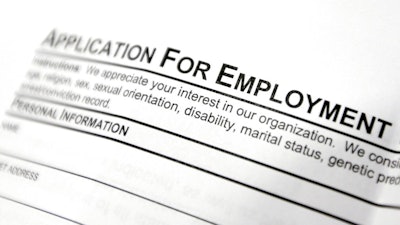
WASHINGTON (AP) — Fewer Americans applied for unemployment benefits last week as most U.S. workers continue to enjoy job security.
THE NUMBERS: The Labor Department said Thursday that claims for jobless aid fell by 10,000 to a seasonally adjusted 245,000 last week. The less-volatile, four-week average rose by 2,250 to 242,000.
THE TAKEAWAY: Applications for unemployment benefits are a proxy for layoffs. They've come in below 300,000, a historically low figure, for 118 straight weeks, longest such streak since 1970.
Overall, nearly 1.92 million people were collecting unemployment checks, down nearly 10 percent from a year ago. The four-week average number of Americans receiving jobless aid was 1.91 million, lowest since January 1974.
KEY DRIVERS: The job market is healthy, though hiring has slowed recently — partly because employers can't find workers when the unemployment rate is at a 16-year low 4.3 percent.
The economy has generated 162,000 jobs a month so far this year — up from an average 157,000 a month from January through May last year, but down from an average 187,000 a month for all of 2016.
"Claims remain low, consistent with the trend in employment growth remaining more than strong enough to keep the unemployment rate trending down," Jim O'Sullivan, chief U.S. economist at High Frequency Economics, said in a research note.






















